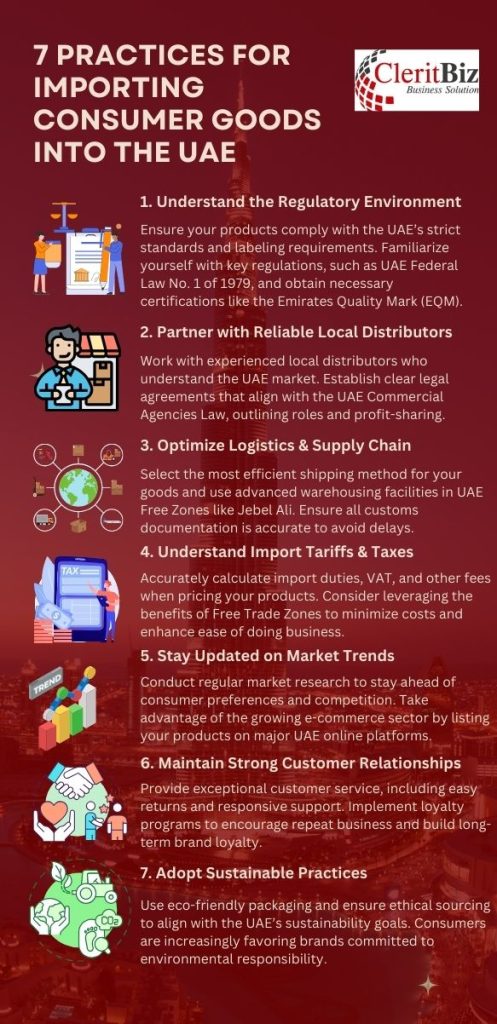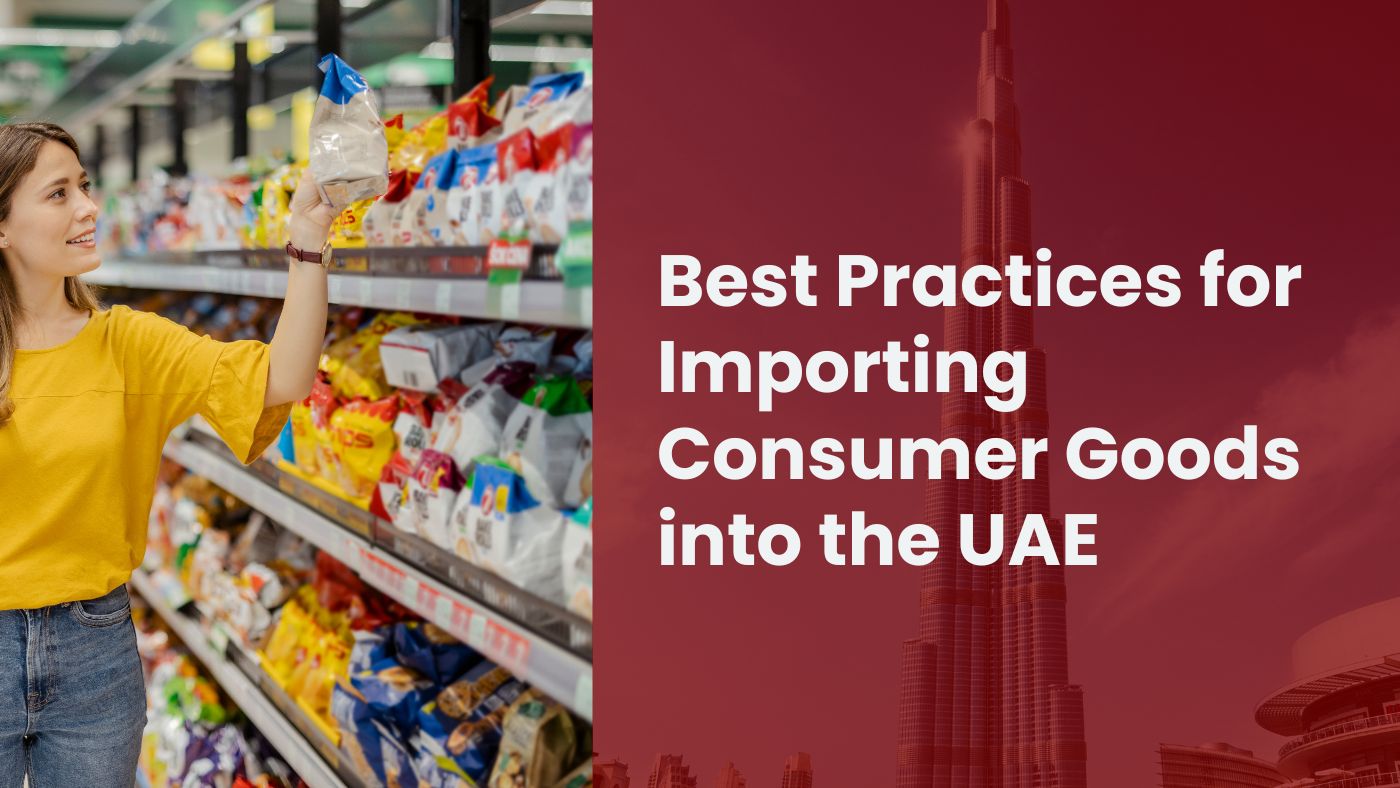The United Arab Emirates (UAE) presents a lucrative market for importers, boasting a population of over 9.8 million people (as of 2023) and a projected household disposable income of US$270.30bn in 2024. This large wealth showcases the reason for UAE’s position as a global trade hub, attracting businesses worldwide to import a diverse range of consumer goods. Furthermore, if you’re looking for business setup in the UAE, it has a favorable business environment that makes it an ideal destination, offering a range of opportunities for companies looking to establish a presence in this thriving market.
Despite the UAE’s lucrative market and potential for high returns, the import process is complex and full of challenges. While the UAE offers significant opportunities for importers, it’s essential to understand that the market is highly regulated, with specific standards and requirements for various product categories. That’s why adhering to the practices is crucial.
This blog offers essential guidelines to help you successfully import consumer goods in the UAE. Whether you are a seasoned importer or new to the UAE market, adhering to the practices is necessary for navigating local regulations and optimizing your operations.
7 Practices for Importing Consumer Goods into the UAE

1. Understand the Regulatory Environment (Strict Standards and Clear Labeling)
The UAE has strict regulations governing the import of consumer goods. Familiarize yourself with the UAE Federal Law No. 1 of 1979 concerning the regulation of Industry Affairs, which outlines the standards for product safety, labeling, and certification. Key regulatory bodies include the Emirates Authority for Standardization and Metrology (ESMA) and the Dubai Municipality.
- Compliance with Standards: Ensure that your products comply with the UAE’s specific standards and certifications, such as the Emirates Quality Mark (EQM) or the Conformity Assessment Scheme.
- Labeling Requirements: Products must be labeled in Arabic (and often English) with clear information on the origin, ingredients, usage, and expiry date. Incorrect or misleading labeling can lead to fines, product recalls, or even bans on future imports. The UAE’s stringent food safety framework, established by Federal Law No. 10 of 2015 and enforced by the Ministry of Climate Change and Environment, mandates detailed regulations for food production, import, and labeling. This robust legal framework includes severe penalties, such as fines ranging from AED 10,000 to 100,000 for misleading consumers through false descriptions or incorrect labels, ensuring consumer protection, and maintaining high food quality standards within the country.
2. Partner with Reliable Local Distributors (Market Knowledge and Legal Expertise)
Having a reliable local partner is crucial for navigating the UAE market. Local distributors or agents are often required to help with the importation process, especially for certain categories of goods.
- Due Diligence: Conduct thorough research before selecting a distributor. Check their reputation, experience in your product category (the UAE consumer electronics market is expected to reach US$777.70 million by 2029), and their network within the UAE.
- Legal Agreements: Draft clear contracts outlining the responsibilities, profit-sharing, and duration of the partnership. Make sure the contract complies with the UAE Commercial Agencies Law, which protects the rights of local agents.
3. Optimize Logistics and Supply Chain Management (Efficiency and Cost Savings)
Efficient logistics and supply chain management are key to ensuring your goods reach the UAE market promptly and in good condition.
- Choose the Right Shipping Method: Depending on the nature of your goods, choose between air freight, sea freight, or land transport. Each has its advantages in terms of cost, speed, and safety. Air freight is the preferred method for high-value goods, while sea freight is more cost-effective for bulkier items.
- Warehousing and Storage: Consider the warehousing facilities in the UAE. The Dubai Logistics City and Jebel Ali Free Zone offer state-of-the-art storage solutions, which are crucial for perishable goods (the UAE imported USD 12.5 billion worth of food in 2022) or items that require special handling.
- Customs Clearance: Work closely with your customs broker to ensure all documentation is in order, including the bill of lading, commercial invoice, and packing list. Familiarize yourself with the UAE’s Harmonized System (HS) codes to avoid delays in customs clearance. There are over 5,000 HS codes, so proper classification is essential.
4. Understand Import Tariffs and Taxes (Cost Factors and Free Trade Zone Advantages)
The UAE imposes import duties on various goods, with rates typically ranging from 0% to 5%. However, some products, such as alcohol and tobacco, attract higher tariffs.
- Calculate Costs Accurately: Factor in the cost of tariffs, Value Added Tax (VAT), and any other fees when pricing your products. The current VAT rate in the UAE is 5%, and it applies to most goods and services.
- Free Trade Zones: Consider importing goods through one of the UAE’s Free Trade Zones (FTZs) to benefit from tax exemptions and 100% foreign ownership. FTZs like Jebel Ali Free Zone and Dubai Airport Free Zone offer significant cost savings and ease of doing business. The UAE boasts over 40 established FTZs, making it a global leader in this sector.
5. Stay Updated on Market Trends (Consumer Preferences and E-Commerce Boom)
The consumer market in the UAE is dynamic, with trends shifting rapidly. Staying informed about the latest consumer preferences can give you a competitive edge.
- Market Research: Regularly conduct market research to understand consumer demands, pricing trends, and competition. The UAE market is highly diverse, with expatriates making up a significant portion of the population (88.5% of the total population), influencing demand for various products. For instance, the demand for Western fashion and luxury goods is notably high.
- Adapt to E-Commerce Growth: E-commerce is booming in the UAE, especially post-pandemic. The UAE’s e-commerce market is expected to reach $9.2 billion USD by 2026. If you are importing consumer goods, consider leveraging online platforms for distribution. Ensure your products are listed on popular UAE e-commerce platforms like Noon, Amazon.ae, and Carrefour UAE.
6. Maintain Strong Customer Relationships (Customer Satisfaction and Loyalty)
Building and maintaining strong relationships with customers is essential for long-term success in the UAE market.
- Customer Service Excellence: Provide exceptional customer service by offering product warranties, easy returns, and responsive after-sales support. UAE consumers value brands that prioritize customer satisfaction. A recent study found that over 80% of UAE consumers are willing to pay a premium for excellent customer service.
- Loyalty Programs: Implement loyalty programs to retain customers and encourage repeat purchases. Customized marketing strategies that resonate with local culture and preferences can help strengthen brand loyalty. Loyalty programs have been shown to increase customer retention by 25% or more.
7. Adopt Sustainable Practices (Environmental Consciousness and Ethical Sourcing)
Sustainability is becoming increasingly important in the UAE. Consumers and regulators alike are focusing on eco-friendly and sustainable products.
- Eco-Friendly Packaging: Use recyclable or biodegradable packaging materials to appeal to environmentally conscious consumers and comply with emerging regulations on plastic use. The UAE government has set ambitious targets to reduce plastic waste to 0% by 2030.
- Ethical Sourcing: Ensure that your goods are sourced ethically, with fair labor practices and minimal environmental impact. This not only enhances your brand reputation but also aligns with the UAE’s vision for a sustainable future. Consumers are increasingly demanding transparency in supply chains, and over 60% of UAE consumers are willing to pay more for products from companies with strong sustainability commitments.
Conclusion
Importing consumer goods in the UAE presents immense opportunities, but success requires careful planning, compliance with regulations, and a deep understanding of the local market. By following these best practices, you can navigate the complexities of the import process and position your business for long-term growth in the UAE. With a strong focus on customer satisfaction, sustainability, and market adaptability, you can build a successful and sustainable business in this dynamic market.

